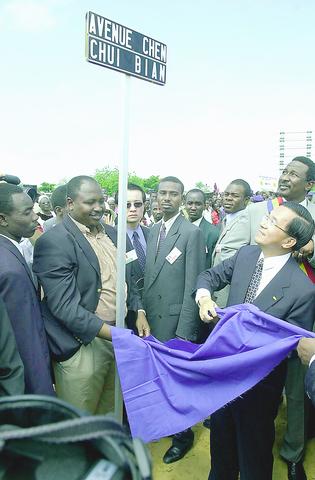As only the second ever non-African head of state to visit Chad, Taiwan's President Chen Shui-bian (陳水扁) was given on Wednesday evening in its capital, N'Djamena, the most elaborate welcome of his six-country tour.
Chad had even, to Chen's surprise, named a 10km road running from the capital to the bridge across the Chari River, "Avenue Chen Shui-bian," as a token of its gratitude for Taiwan's assistance in improving its communications system. On seeing the road sign, Chen proposed that it be changed to "Avenue ROC." Eventually "Taiwan Avenue" was agreed upon.
Chad will also name the bridge for whose construction Taiwan donated US$20 million, "Taiwan Bridge." Chad is the last stop on Chen's first presidential foreign visit, which has included three countries in Central America and three in west Africa.

PHOTO: CHEN CHENG-CHANG, TAIPEI TIMES
Thousands of people crowded the streets from the airport to Chad's presidential mansion to welcome Chen.
Members of the crowd, estimated by the delegation to be even larger than that which turned out to welcome the president in the Gambian capital Banjul, brandished national flags and banners of both countries, chanted words of welcome, and sang and danced to celebrate Chen's arrival.
Accompanying Chad's President Idriss Deby, Chen stood in a stretch limousine, leading a thirty-car motorcade, and waved to the crowds.
Posters of Deby and of Chen, the latter provided by Taiwan's embassy, bedecked walls, trees, and the doors of houses seemingly ubiquitously.
According to officials from Taiwan's embassy, the Chad government ordered the cleaning of all major streets in the capital a week ago and the national television channel repeatedly broadcast popular Taiwanese music and broadcast details of Chen's life.
Taiwan's Ambassador, Chiu Chung-jen (邱仲仁), said that the government had granted half a day's holiday for the occasion.
The first non-African head of state to visit Chad was former French president, Charles De Gaulle, who visited in the 1960s as head of the country's former colonial master. Chad declared independence from France in 1960.
Deby expressed a hearty welcome while meeting with Chen, saying the assistance of the Republic of China over the past three years had improved Chad's development "efficiently."
"Not only in agricultural development and highway construction but also in culture, politics, health and economics we have accomplished much," Deby told Chen. Deby pointed out that Taiwan-Chad relations stretched as far back as the 1960s.
Chad first established ties with Taiwan in 1962 but opened its door to the People's Republic of China in 1972, prompting Taiwan to immediately sever diplomatic relations.
The two countries re-established diplomatic relations in 1997 following the granting by Taiwan of substantial financial aid to Chad in the 1990s.
Ambassador Chiu said that since the World Development Bank approved a project allowing Chad to drill for oil in July this year, the nation would receive US$2 billion per year once requisite construction work had been completed in four years' time.
Chiu, however, said that oil revenues would only be likely to last 25 years.

DAREDEVIL: Honnold said it had always been a dream of his to climb Taipei 101, while a Netflix producer said the skyscraper was ‘a real icon of this country’ US climber Alex Honnold yesterday took on Taiwan’s tallest building, becoming the first person to scale Taipei 101 without a rope, harness or safety net. Hundreds of spectators gathered at the base of the 101-story skyscraper to watch Honnold, 40, embark on his daredevil feat, which was also broadcast live on Netflix. Dressed in a red T-shirt and yellow custom-made climbing shoes, Honnold swiftly moved up the southeast face of the glass and steel building. At one point, he stepped onto a platform midway up to wave down at fans and onlookers who were taking photos. People watching from inside

A Vietnamese migrant worker yesterday won NT$12 million (US$379,627) on a Lunar New Year scratch card in Kaohsiung as part of Taiwan Lottery Co’s (台灣彩券) “NT$12 Million Grand Fortune” (1200萬大吉利) game. The man was the first top-prize winner of the new game launched on Jan. 6 to mark the Lunar New Year. Three Vietnamese migrant workers visited a Taiwan Lottery shop on Xinyue Street in Kaohsiung’s Gangshan District (崗山), a store representative said. The player bought multiple tickets and, after winning nothing, held the final lottery ticket in one hand and rubbed the store’s statue of the Maitreya Buddha’s belly with the other,

‘NATO-PLUS’: ‘Our strategic partners in the Indo-Pacific are facing increasing aggression by the Chinese Communist Party,’ US Representative Rob Wittman said The US House of Representatives on Monday released its version of the Consolidated Appropriations Act, which includes US$1.15 billion to support security cooperation with Taiwan. The omnibus act, covering US$1.2 trillion of spending, allocates US$1 billion for the Taiwan Security Cooperation Initiative, as well as US$150 million for the replacement of defense articles and reimbursement of defense services provided to Taiwan. The fund allocations were based on the US National Defense Authorization Act for fiscal 2026 that was passed by the US Congress last month and authorized up to US$1 billion to the US Defense Security Cooperation Agency in support of the

‘COMMITTED TO DETERRENCE’: Washington would stand by its allies, but it can only help as much as countries help themselves, Raymond Greene said The US is committed to deterrence in the first island chain, but it should not bear the burden alone, as “freedom is not free,” American Institute in Taiwan Director Raymond Greene said in a speech at the Institute for National Defense and Security Research’s “Strengthening Resilience: Defense as the Engine of Development” seminar in Taipei yesterday. In the speech, titled “Investing Together and a Secure and Prosperous Future,” Greene highlighted the contributions of US President Donald Trump’s administration to Taiwan’s defense efforts, including the establishment of supply chains for drones and autonomous systems, offers of security assistance and the expansion of